I review books and films and TV shows. Feel free to send recommendations and I hope you have a good time
Don't wanna be here? Send us removal request.
Text
Hot take but I really do think that some of y’all need to consider how/why/when/how often you’re making fun of straight people for being straight
I do it too, I’m not going to pretend I don’t make jokes about the hets, or the down with cis bus, or whatever
But I recently befriended a cis, straight dude and I have watched him be dismissed, degraded, and unambiguously insulted for the perceived “crime” of being straight — all in queer environments where he is allegedly “completely welcome” and surrounded by “friends”
This guy is not a toxic person! But I have seen him be made to feel so small and like his comfort and safety in those spaces are conditional on his silence and acceptance of being treated like a human dunk zone, and I think that some of y’all have had so much shit from straight/cis people that the second you feel like you’ve got an inch, you want to luxuriate in the perceived catharsis of bullying someone who— actually —doesn’t deserve it
And until he very, very carefully mentioned to me in private that it makes him feel bad, I didn’t even clock that I was involved in doing that, that it had become so instinctive for me to make casual jokes like that, and that— well meaning or otherwise —I had been contributing to an environment that made someone I really really like feel like shit
So, I dunno, I think maybe some of y’all should think about that too
41K notes
·
View notes
Text
more catradora ! js finished rewatching it, absolute cinema fr


635 notes
·
View notes
Text
Too many writers are using generative 'AI' to make their book covers, so I've written a guide on how to make your own cover for free or cheap without turning to a machine.
If you can't afford to pay an artist, you CAN make your own!
I hope this is a helpful overview that covers the basics and points to some free resources.
24K notes
·
View notes
Text
I need some good fantasy or scifi to read that doesn't involve romance. preferably urban fantasy or cyberpunk or just downright weird shit, but I could do with more traditional stuff. as long as people aren't driven by lust. I'm so so soso so sososososoooooooo very tired of reading that sort of thing in traditional print novels.
3K notes
·
View notes
Text
2025 Beat the Backlist Challenge
The 2025 reading challenge prompts are now available!
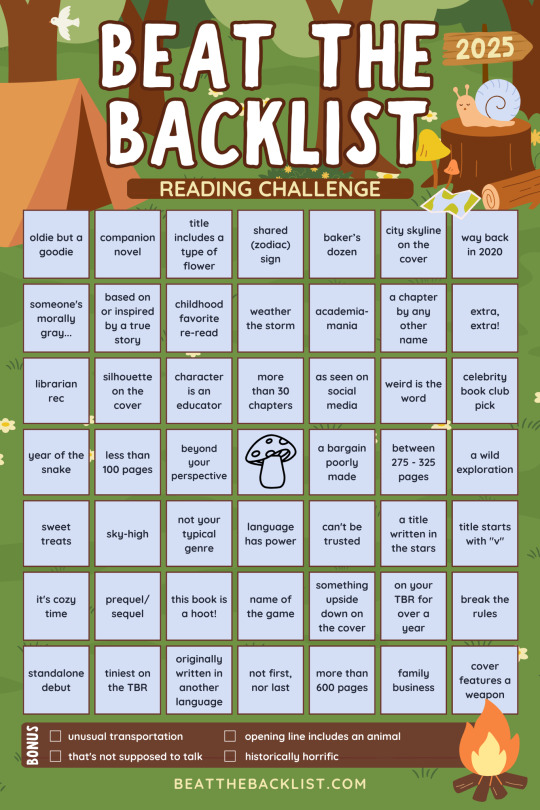
196 notes
·
View notes
Text


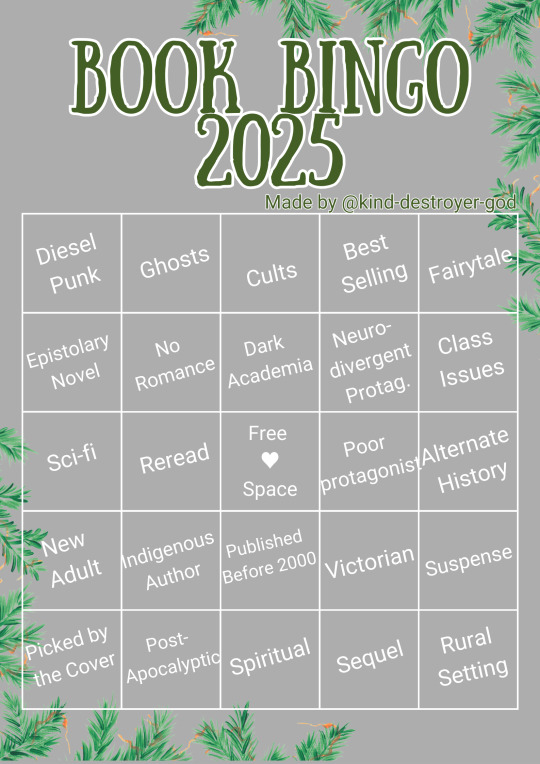
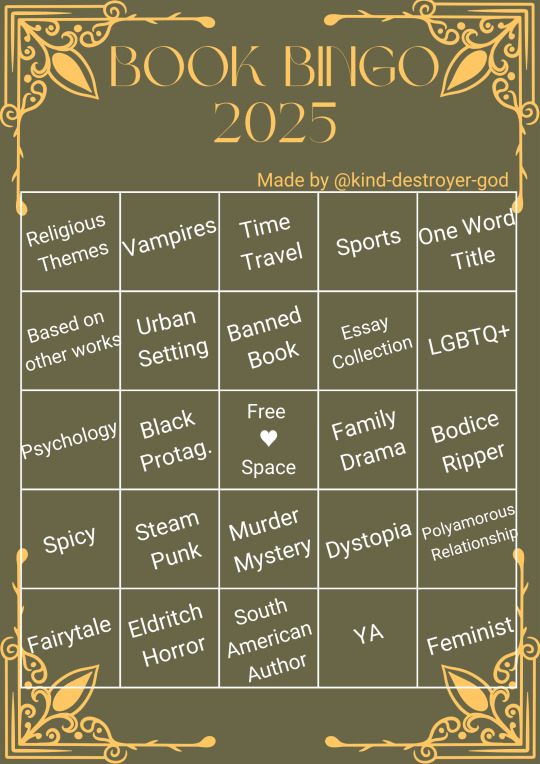





Made somewhat new book bingo cards! Similar to the ones I made last year, with a few changes. Each card is different so pick the one that appeals to you the most!
40 notes
·
View notes
Text






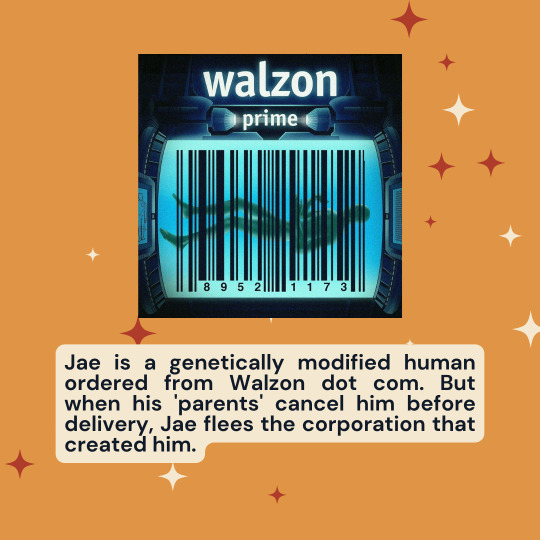


Sci-Fi audio dramas for fans of The Martian! Click an image to embiggen it.
135 notes
·
View notes
Text
This fanfic I’m never going to write is really damn good.
93K notes
·
View notes
Text
Happy International Lesbian Day! Here's some super brief book recs to celebrate
Books dealing with love, loss, longing and abandonment
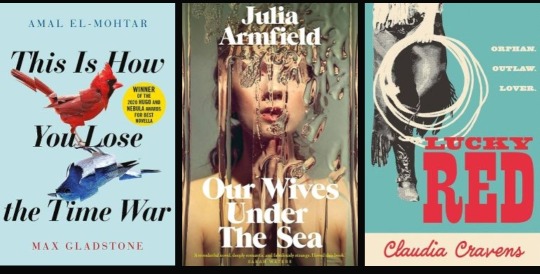
This is How You Lose The Time War is a short but beautifully written epistolary novel between two agents on opposite sides of a time war as they slowly fall in love.
Our Wives Under the Sea is one of the most beautifully written debuts I've ever read about a woman whose wife comes home wrong after they thought she'd died at sea and how it feels to grieve the loss of someone who's still in your home.
Lucky Red is a western novel about a young girl working in a brothel who meets her first female gunslinger and falls head over heels for her, and the consequences that come with loving dangerous people.
Body horror galore
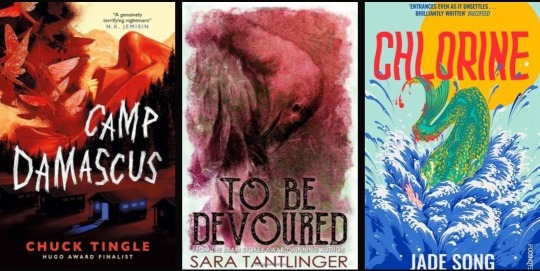
Camp Damascus is about a young woman living in a super conservative christian town built around the worlds most successful conversion camp and the horrors that are uncovered there when praying the gay away fails.
To Be Devoured is about a woman whose fascination with the local vultures turns into obsession and the urge to know what carrion tastes like overtakes her life and leads her down stranger and stranger paths.
Chlorine is about a girl whose entire life revolves around being a competitive swimmer, and how abuse, neglect, and obsession with being the best takes its toll on the young women caught up in these destructive cycles.
Flawed character studies
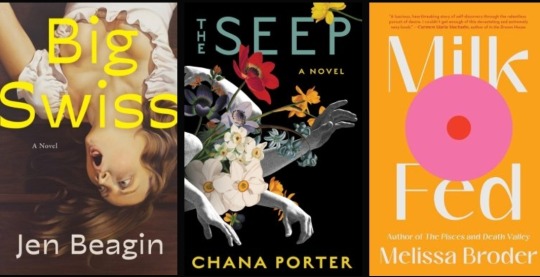
Big Swiss is about a woman who has a kitchen floor reset in her 40s, moves away and starts a new life as a transcriber for a sex therapist and becomes obsessed with one of his clients before inserting herself into this poor woman's life.
The Seep is a speculative sci-fi set in a future where there's been a quiet alien invasion that has given people the ability to make almost any changes to their own bodies and what that world feels like to someone who doesn't want to partake.
Milk Fed is about a woman in therapy who feels cut off from almost everything until she meets another woman who triggers in her a melding of sex, hunger, and religion and where that takes her. Huge trigger warnings for ED content. It gets tough, y'all.
Fantastical wlw books
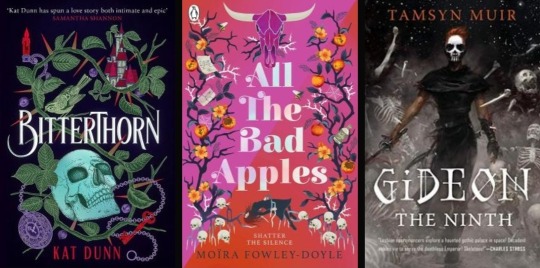
Bitterthorn is an amalgamation of fairytales retold as a slow burn sapphic love story between a sad young girl from a cursed land and the evil witch who takes her as a companion in the latest of the generational sacrifices made to appease her.
All the Bad Apples may be set in contemporary Ireland but it is a fairytale following a young girl as she travels across the country looking for a sister she refuses to believe is dead and the people she meets along the way.
Gideon the Ninth needs no introduction on this site but for the sake of formatting - lesbian necromancers in space who find themselves in an isolated murder mystery plot. It's not a romance but it is a love story and this series will change your life if you let it.
Translated novels
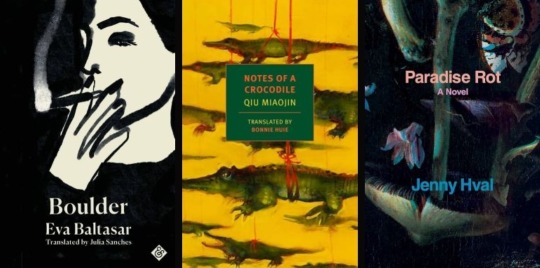
Boulder is a short character study following a free spirited woman when she accidentally settles down with the woman she loves and how love and resentment can take up the same space in your chest when life doesn't turn out the way you hoped it would.
Notes of a Crocodile is a cult classic coming of age story about queer teens in Taipei in the 1980s. It was written in the 90s so please keep that in mind if you choose to read it.
Paradise Rot is about an international student studying in Australia and her growing obsession with her housemate as they share a space that allows no privacy. I've never read anything that feels stickier.
1K notes
·
View notes
Text

SUBMISSIONS for the Disability in Fantasy short story anthology are OPEN! 💖
We want your fantasy fiction🫵
Anthology Theme: Traditional Fantasy. Think fairy tale, folk tale, myth, legend, or fable. Imagine what kind of story might be passed down from generation to generation, whose origins have been lost to time.
Word limit: 4000 words.
Click here to see submissions guidelines, info on the theme, eligibility, payment, donations, and more.
Please share to spread the word!
86 notes
·
View notes
Text
Remember when I published this in a serious journal and everyone thought it was very funny?

Well, Gender/Fucking: The Pleasures and Politics of Living in a Gendered Body is basically where I stake my claim at being a depraved freak. 😉
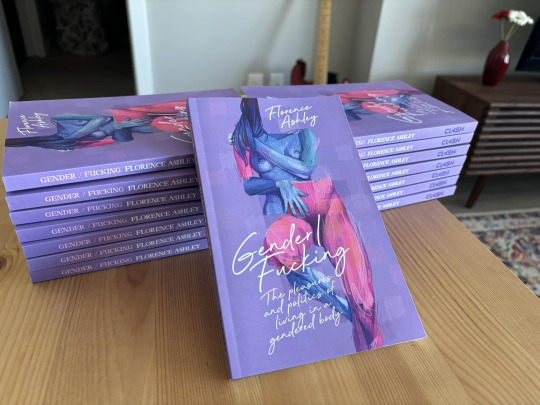
Don’t wait! Get your copy now! Available on Bookshop and plenty more.
2K notes
·
View notes
Text
Writing advice from my uni teachers:
If your dialog feels flat, rewrite the scene pretending the characters cannot at any cost say exactly what they mean. No one says “I’m mad” but they can say it in 100 other ways.
Wrote a chapter but you dislike it? Rewrite it again from memory. That way you’re only remembering the main parts and can fill in extra details. My teacher who was a playwright literally writes every single script twice because of this.
Don’t overuse metaphors, or they lose their potency. Limit yourself.
Before you write your novel, write a page of anything from your characters POV so you can get their voice right. Do this for every main character introduced.
232K notes
·
View notes
Text



a poem from my upcoming collection, "there used to be a lake here once" (2024) about losing my grandmother exactly a year ago, on 23rd of february, 2023 after a very sudden illness, and my lingering regrets at being unable to give her what she wanted– the dream of seeing her granddaughter get married. a bengali hindu immigrant from barisal, bangladesh, my thamma was my last surviving grandparent. I never came out to her, as either queer or trans.
author's note: this is a very personal poem written by a trans queer bengali person about their own childhood and coming-of-age. please do not tag this as fictional characters or inspo, removing the bengali and/or trans context. if you want to write about your own experiences or thoughts on dealing with loss as queer folk, I welcome them. terfs and radfems dni.
287 notes
·
View notes
Text
A Guide to Historically Accurate Regency-Era Names

I recently received a message from a historical romance writer asking if I knew any good resources for finding historically accurate Regency-era names for their characters.
Not knowing any off the top of my head, I dug around online a bit and found there really isn’t much out there. The vast majority of search results were Buzzfeed-style listicles which range from accurate-adjacent to really, really, really bad.
I did find a few blog posts with fairly decent name lists, but noticed that even these have very little indication as to each name’s relative popularity as those statistical breakdowns really don't exist.
I began writing up a response with this information, but then I (being a research addict who was currently snowed in after a blizzard) thought hey - if there aren’t any good resources out there why not make one myself?
As I lacked any compiled data to work from, I had to do my own data wrangling on this project. Due to this fact, I limited the scope to what I thought would be the most useful for writers who focus on this era, namely - people of a marriageable age living in the wealthiest areas of London.
So with this in mind - I went through period records and compiled the names of 25,000 couples who were married in the City of Westminster (which includes Mayfair, St. James and Hyde Park) between 1804 to 1821.
So let’s see what all that data tells us…
To begin - I think it’s hard for us in the modern world with our wide and varied abundance of first names to conceive of just how POPULAR popular names of the past were.
If you were to take a modern sample of 25-year-old (born in 1998) American women, the most common name would be Emily with 1.35% of the total population. If you were to add the next four most popular names (Hannah, Samantha, Sarah and Ashley) these top five names would bring you to 5.5% of the total population. (source: Social Security Administration)
If you were to do the same survey in Regency London - the most common name would be Mary with 19.2% of the population. Add the next four most popular names (Elizabeth, Ann, Sarah and Jane) and with just 5 names you would have covered 62% of all women.
To hit 62% of the population in the modern survey it would take the top 400 names.
The top five Regency men’s names (John, William, Thomas, James and George) have nearly identical statistics as the women’s names.
I struggled for the better part of a week with how to present my findings, as a big list in alphabetical order really fails to get across the popularity factor and also isn’t the most tumblr-compatible format. And then my YouTube homepage recommended a random video of someone ranking all the books they’d read last year - and so I present…
The Regency Name Popularity Tier List
The Tiers
S+ - 10% of the population or greater. There is no modern equivalent to this level of popularity. 52% of the population had one of these 7 names.
S - 2-10%. There is still no modern equivalent to this level of popularity. Names in this percentage range in the past have included Mary and William in the 1880s and Jennifer in the late 1970s (topped out at 4%).
A - 1-2%. The top five modern names usually fall in this range. Kids with these names would probably include their last initial in class to avoid confusion. (1998 examples: Emily, Sarah, Ashley, Michael, Christopher, Brandon.)
B - .3-1%. Very common names. Would fall in the top 50 modern names. You would most likely know at least 1 person with these names. (1998 examples: Jessica, Megan, Allison, Justin, Ryan, Eric)
C - .17-.3%. Common names. Would fall in the modern top 100. You would probably know someone with these names, or at least know of them. (1998 examples: Chloe, Grace, Vanessa, Sean, Spencer, Seth)
D - .06-.17%. Less common names. In the modern top 250. You may not personally know someone with these names, but you’re aware of them. (1998 examples: Faith, Cassidy, Summer, Griffin, Dustin, Colby)
E - .02-.06%. Uncommon names. You’re aware these are names, but they are not common. Unusual enough they may be remarked upon. (1998 examples: Calista, Skye, Precious, Fabian, Justice, Lorenzo)
F - .01-.02%. Rare names. You may have heard of these names, but you probably don’t know anyone with one. Extremely unusual, and would likely be remarked upon. (1998 examples: Emerald, Lourdes, Serenity, Dario, Tavian, Adonis)
G - Very rare names. There are only a handful of people with these names in the entire country. You’ve never met anyone with this name.
H - Virtually non-existent. Names that theoretically could have existed in the Regency period (their original source pre-dates the early 19th century) but I found fewer than five (and often no) period examples of them being used in Regency England. (Example names taken from romance novels and online Regency name lists.)
Just to once again reinforce how POPULAR popular names were before we get to the tier lists - statistically, in a ballroom of 100 people in Regency London: 80 would have names from tiers S+/S. An additional 15 people would have names from tiers A/B and C. 4 of the remaining 5 would have names from D/E. Only one would have a name from below tier E.
Women's Names
S+ Mary, Elizabeth, Ann, Sarah
S - Jane, Mary Ann+, Hannah, Susannah, Margaret, Catherine, Martha, Charlotte, Maria
A - Frances, Harriet, Sophia, Eleanor, Rebecca
B - Alice, Amelia, Bridget~, Caroline, Eliza, Esther, Isabella, Louisa, Lucy, Lydia, Phoebe, Rachel, Susan
C - Ellen, Fanny*, Grace, Henrietta, Hester, Jemima, Matilda, Priscilla
D - Abigail, Agnes, Amy, Augusta, Barbara, Betsy*, Betty*, Cecilia, Christiana, Clarissa, Deborah, Diana, Dinah, Dorothy, Emily, Emma, Georgiana, Helen, Janet^, Joanna, Johanna, Judith, Julia, Kezia, Kitty*, Letitia, Nancy*, Ruth, Winifred>
E - Arabella, Celia, Charity, Clara, Cordelia, Dorcas, Eve, Georgina, Honor, Honora, Jennet^, Jessie*^, Joan, Joyce, Juliana, Juliet, Lavinia, Leah, Margery, Marian, Marianne, Marie, Mercy, Miriam, Naomi, Patience, Penelope, Philadelphia, Phillis, Prudence, Rhoda, Rosanna, Rose, Rosetta, Rosina, Sabina, Selina, Sylvia, Theodosia, Theresa
F - (selected) Alicia, Bethia, Euphemia, Frederica, Helena, Leonora, Mariana, Millicent, Mirah, Olivia, Philippa, Rosamund, Sybella, Tabitha, Temperance, Theophila, Thomasin, Tryphena, Ursula, Virtue, Wilhelmina
G - (selected) Adelaide, Alethia, Angelina, Cassandra, Cherry, Constance, Delilah, Dorinda, Drusilla, Eva, Happy, Jessica, Josephine, Laura, Minerva, Octavia, Parthenia, Theodora, Violet, Zipporah
H - Alberta, Alexandra, Amber, Ashley, Calliope, Calpurnia, Chloe, Cressida, Cynthia, Daisy, Daphne, Elaine, Eloise, Estella, Lilian, Lilias, Francesca, Gabriella, Genevieve, Gwendoline, Hermione, Hyacinth, Inez, Iris, Kathleen, Madeline, Maude, Melody, Portia, Seabright, Seraphina, Sienna, Verity
Men's Names
S+ John, William, Thomas
S - James, George, Joseph, Richard, Robert, Charles, Henry, Edward, Samuel
A - Benjamin, (Mother’s/Grandmother’s maiden name used as first name)#
B - Alexander^, Andrew, Daniel, David, Edmund, Francis, Frederick, Isaac, Matthew, Michael, Patrick~, Peter, Philip, Stephen, Timothy
C - Abraham, Anthony, Christopher, Hugh>, Jeremiah, Jonathan, Nathaniel, Walter
D - Adam, Arthur, Bartholomew, Cornelius, Dennis, Evan>, Jacob, Job, Josiah, Joshua, Lawrence, Lewis, Luke, Mark, Martin, Moses, Nicholas, Owen>, Paul, Ralph, Simon
E - Aaron, Alfred, Allen, Ambrose, Amos, Archibald, Augustin, Augustus, Barnard, Barney, Bernard, Bryan, Caleb, Christian, Clement, Colin, Duncan^, Ebenezer, Edwin, Emanuel, Felix, Gabriel, Gerard, Gilbert, Giles, Griffith, Harry*, Herbert, Humphrey, Israel, Jabez, Jesse, Joel, Jonas, Lancelot, Matthias, Maurice, Miles, Oliver, Rees, Reuben, Roger, Rowland, Solomon, Theophilus, Valentine, Zachariah
F - (selected) Abel, Barnabus, Benedict, Connor, Elijah, Ernest, Gideon, Godfrey, Gregory, Hector, Horace, Horatio, Isaiah, Jasper, Levi, Marmaduke, Noah, Percival, Shadrach, Vincent
G - (selected) Albion, Darius, Christmas, Cleophas, Enoch, Ethelbert, Gavin, Griffin, Hercules, Hugo, Innocent, Justin, Maximilian, Methuselah, Peregrine, Phineas, Roland, Sebastian, Sylvester, Theodore, Titus, Zephaniah
H - Albinus, Americus, Cassian, Dominic, Eric, Milo, Rollo, Trevor, Tristan, Waldo, Xavier
& Men were sometimes given a family surname (most often their mother's or grandmother's maiden name) as their first name - the most famous example of this being Fitzwilliam Darcy. If you were to combine all surname-based first names as a single 'name' this is where the practice would rank.
*Rank as a given name, not a nickname
+If you count Mary Ann as a separate name from Mary - Mary would remain in S+ even without the Mary Anns included
~Primarily used by people of Irish descent
^Primarily used by people of Scottish descent
>Primarily used by people of Welsh descent
I was going to continue on and write about why Regency-era first names were so uniform, discuss historically accurate surnames, nicknames, and include a little guide to finding 'unique' names that are still historically accurate - but this post is already very, very long, so that will have to wait for a later date.
If anyone has any questions/comments/clarifications in the meantime feel free to message me.
Methodology notes: All data is from marriage records covering six parishes in the City of Westminster between 1804 and 1821. The total sample size was 50,950 individuals.
I chose marriage records rather than births/baptisms as I wanted to focus on individuals who were adults during the Regency era rather than newborns. I think many people make the mistake when researching historical names by using baby name data for the year their story takes place rather than 20 to 30 years prior, and I wanted to avoid that. If you are writing a story that takes place in 1930 you don’t want to research the top names for 1930, you need to be looking at 1910 or earlier if you are naming adult characters.
I combined (for my own sanity) names that are pronounced identically but have minor spelling differences: i.e. the data for Catherine also includes Catharines and Katherines, Susannah includes Susannas, Phoebe includes Phebes, etc.
The compound 'Mother's/Grandmother's maiden name used as first name' designation is an educated guesstimate based on what I recognized as known surnames, as I do not hate myself enough to go through 25,000+ individuals and confirm their mother's maiden names. So if the tally includes any individuals who just happened to be named Fitzroy/Hastings/Townsend/etc. because their parents liked the sound of it and not due to any familial relations - my bad.
I did a small comparative survey of 5,000 individuals in several rural communities in Rutland and Staffordshire (chosen because they had the cleanest data I could find and I was lazy) to see if there were any significant differences between urban and rural naming practices and found the results to be very similar. The most noticeable difference I observed was that the S+ tier names were even MORE popular in rural areas than in London. In Rutland between 1810 and 1820 Elizabeths comprised 21.4% of all brides vs. 15.3% in the London survey. All other S+ names also saw increases of between 1% and 6%. I also observed that the rural communities I surveyed saw a small, but noticeable and fairly consistent, increase in the use of names with Biblical origins.
Sources of the records I used for my survey:
Ancestry.com. England & Wales Marriages, 1538-1988 [database on-line].
Ancestry.com. Westminster, London, England, Church of England Marriages and Banns, 1754-1935 [database on-line].
13K notes
·
View notes
Text
As per my last post, if yall arent aware — Cait Corrain, the author of the upcoming Crown of Starlight made a bunch of fake accounts on Goodreads to review-bomb other debut authors, almost entirely BIPOC, with 1 star while 5-starring her own book. She also added traditionally published debut authors to a list derogatorily labeling them as "self-published" hacks. She went after random books that are Greek mythology retellings, like her own is, and again targeted BIPOC authors. She even targeted my good friend RM Virtues, who is an indie author who writes queer Black Greek myth reimaginings.
Many of those she attacked were people who considered her a colleague and friend. She's tried to spin a lie about how she's being framed by someone from her Reylo fandom days, but Reylos have disproven that already.
Cait allegedly liked to brag about how her publisher treated her like royalty, and she had a massive Illumicrate deal. Her book was also getting favorable advanced reviews and had a beautiful cover, so she had nothing to be jealous of. She's potentially destroyed her career due to racism alone. Do not buy her book and do not support her.
Here is a thread if you want specifics and here is the 31-page doc of evidence.
8K notes
·
View notes
Text
Does anyone have good wlw book recs?? Specifically with one of them at least being masc? I'm so sick of going on tiktok looking for books where it's just two fem white women. 😭 I want more then the same 5 books yk??
580 notes
·
View notes
Text
poetry outlets that support a free palestine
after finding out that the poetry foundation/POETRY magazine pulled a piece that discussed anti-zionism because they "don't want to pick a side" during the current genocide, i decided to put together a list of online outlets who are explicitly in solidarity with palestine where you can read (english-language) poetry, including, except where otherwise stated, by palestinian poets!
my criteria for this is not simply that they have published palestinian poets or pro-palestine statements in the past; i only chose outlets that, since october 7, 2023, have done one of the following:
published a solidarity statement against israeli occupation & genocide
signed onto the open letter for writers against the war on gaza and/or the open letter boycotting the poetry foundation
published content that is explicitly pro-palestine or anti-zionist, including poetry that explicitly deals with israeli occupation & genocide
shared posts that are pro-palestine on their social media accounts
fyi this is undoubtedly a very small sample. also some of these sites primarily feature nonfiction or short stories, but they do all publish poetry.
outlets that focus entirely on palestinian or SWANA (southwest asia and north africa) literature
we are not numbers, a palestinian youth-led project to write about palestinian lives
arab lit, a magazine for arabic literature in translation that is run by a crowd-funded collective
sumuo, an arab magazine, platform, and community (they appear to have a forthcoming palestine special print issue edited by leena aboutaleb and zaina alsous)
mizna, a platform for contemporary SWANA (southwest asian & north africa) lit, film, and art
the markaz review, a literary arts publication and cultural institution that curates content and programs on the greater middle east and communities in diaspora
online magazines who have published special issues of all palestinian writers (and all of them publish palestinian poets in their regular issues too)
fiyah literary magazine in december 2021, edited by nadia shammas and summer farah (if you have $6 usd to spare, proceeds from the e-book go to medical aid for palestinians)
strange horizons in march 2021, edited by rasha abdulhadi
the baffler in june 2021, curated by poet/translators fady joudah & lena khalaf tuffaha
the markaz review has two palestine-specific issues, on gaza and on palestinians in israel, currently free to download
literary hub featured palestinian poets in 2018 for the anniversary of the 1948 nakba
adi magazine, who have shifted their current (october 2023) issue to be all palestinian writers
outlets that generally seem to be pro-palestine/publish pro-palestine pieces and palestinian poetry
protean magazine (here's their solidarity statement)
poetry online (offering no-fee submissions to palestinian writers)
sundog lit (offering no-fee submissions to palestinian writers through december 1, 2023)
guernica magazine (here's a twitter thread of palestinian poetry they've published)
split this rock (here's their solidarity statement)
the margins by the asian-american writers' workshop
the offing magazine
rusted radishes
voicemail poems
jewish currents
the drift magazine
asymptote
the poetry project
ctrl + v journal
the funambulist magazine
n+1 magazine (signed onto the open letter and they have many pro-palestine articles, but i'm not sure if they have published palestinian poets specifically)
hammer & hope (signed onto the letter but they are a new magazine only on their second issue and don't appear to have published any palestinian poets yet)
if you know others, please add them on!
4K notes
·
View notes